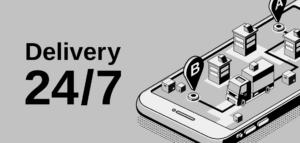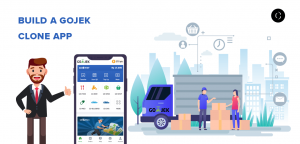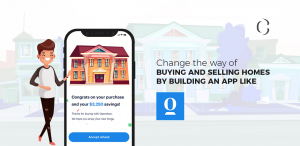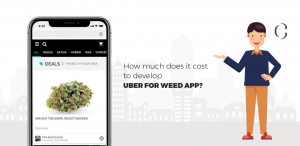On Demand Logistics app development: 8 most crucial questions answered to develop a logistics app brilliantly
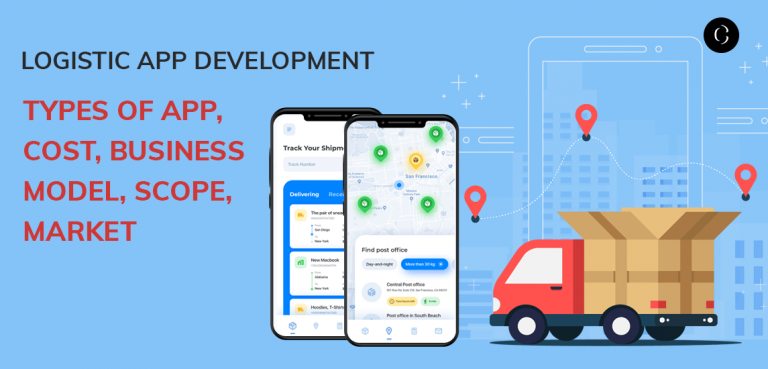
Regardless of the scale, businesses serving in the logistics industry accomplish probably the highest number of costly business processes to send a small parcel or a big consignment to its destination.
Each of their business processes involves manpower as well as technology. However, the logistics industry is one of the industries which hasn’t yet fully adopted the technology. Businesses serving in the logistics industry with some old school techniques are losing a heap of money every day. They cannot manage their fleet, workforce, inventory, and customers efficiently.
On the other hand, businesses which have adopted the technologies and shifted their all business processes on advanced AI-enabled platforms or software or apps have been taking everything out of this very profitable logistics industry and dominating the market.
So, if you are serving in the logistics industry with the same conventional business strategies but wishing to level it up and create a comprehensive online solution to manage, control and sustain all business processes of your any kind of logistics business or you are an entrepreneur and want to solve problems associated with logistics industry, you have come to the right place.
In this blog, we will answer 8 most crucial questions which will clear all of your doubts you may have before going into logistics app development. We will also answer some of your most anticipated questions related to the cost & time of logistics app development and our services. So, without any further due, let’s proceed.
Question #1: What are the types of logistics apps?
Logistics is a vast industry. It brings many businesses under one roof. Though these all businesses fall under the same logistics industry, the basic business architecture of each of these businesses is different. Thus, they all cry for different apps, but with almost similar app modules and business models. Following are the top major types of logistics apps our business experts have distributed.
- Logistics app to manage the fleet: If a logistics business is only dealing with transportation, they should opt for such kind of fleet management app. Through such app, they can track the location, insurance, health, and many other things of every vehicle they have in their fleet. They can also assign a driver to each vehicle and see his work performance, and total working hours.
- On-demand logistics apps: If you want to run your logistics business in Uber-fashion, which is by the way a very money-making approach, you should develop an on-demand logistics app. However, in the on-demand logistics app, you have to develop a dedicated app for drivers or service providers who satisfy the demand raised by the users. This type of app is armed with all necessary features to satisfy the delivery requirements of the users and manufacturers through independent service providers within hours.
- Apps for warehouse: If you want to store data of items you have in your warehouse and access that data with just a single tap, you should opt for a warehouse management app. It facilitates you to know the availability of every item, remaining stock, where you have kept an item in your warehouse, workers working in your warehouse, their shift timing, their attendance, and even their performance matrix.
- The extended logistics app: If your logistics business deals with the storage of the items, delivery of the items and you own your own fleet of vehicles, the extended logistics app enables you to cope up with the challenges associated with item storage, item delivery, and fleet management through the one single app.
Question #2: Is it a safe bet to develop a logistics app in 2020?
Generally, entrepreneurs and business owners who are already serving in the logistics industry are developing logistics apps in 2020. These both have almost similar business requirements and business goals, except the one. While entrepreneurs want to develop logistics apps to earn a heap of money by solving problems end-users are facing, business owners develop logistics apps to earn a heap of money by streamlining or automating their business processes and by offering remarkable customer service.
Here, if we summarize the business goals of both entrepreneurs and business owners, they are – earning more money and streamlining the business processes of logistics business. Thus we will evaluate whether it is a safe bet or not, based on its potentiality to solve major challenges related to profit and business processes associated with logistics business.
Question #2.1: What are the logistics business challenges related to profit and business processes a logistics app can solve?
- Scarcity in coordination: Logistics business consists of many geographically distributed sites, workers working on each site, and many other partnered companies. Because of such a fragmented nature of the logistics business, it is impossible to have centralized control which affects the customer service as well as deliveries. But an app offers businesses an extensive dashboard from where a business owner can monitor every actor as well as consignment and establish a productive coordination between all parties. Such efforts easily result in higher customer satisfaction, quick deliveries, and higher earning.
- Stock errors: Warehouse management with the same old school techniques isn’t the effortless task, especially when the warehouse stores a large number of items. In the large warehouses, stock errors are very common. A person cannot always keep an eye on each item and its quantity. Stock errors do not only cost the company its reputation but it also costs millions to that company. But with the warehouse management tools or software, you can seamlessly track every item you have in your warehouse. This way, you can prevent the last minute hustle as well as delayed deliveries.
- No direct communication with customers: Customers are the end-users with whom you share your service and earn money. Now, when it comes to getting their feedback and what they firmly believe about your service, you lack the resources to bridge the communication gap. This lack of no direct communication channel eventually makes you lose your customers and suffer a financial loss. But with the logistics app, you cannot only enable customers to raise queries and give feedback but enable them to track their orders, know the estimated arrival date & time and even pick it up from the store.
So, based on the ways a logistics app can qualify businesses to earn more and streamline business processes, here is our after evaluation statement: Yes, logistics app development is the safe bet as it is letting business derive many fruitful benefits!
Question 3: How can I make money with a logistics app?
The business model of a logistics app varies with the type of logistics app you develop. For instance, if you develop a warehouse management app, you can not earn money through the direct channels; you make money by managing the stock precisely and delivering the items rapidly.
Whereas, if you develop an on-demand logistics app, you can make money through the direct channels. With an on-demand logistics app, users book your service and the driver satisfies it. Here, you can make money by taking a commission on the earnings of the drivers as they are using your platform to get the delivery jobs. You can also tie-up with manufacturing or other industries where delivery is the part of their everyday business processes.
We at Coruscate accommodate many well-versed business experts who will make you familiar with the legal and most profitable ways of making money through any type of logistics app. You can book a free consultation session now.
Question 4: Which are the top logistics apps available in the market?
Considering its advantages and easy usage, many entrepreneurs and even logistics business owners have developed different types of logistics apps which serve many purposes and accredit logistics businesses to expand and reach more customers. These apps are contributing very well to keep the logistics industry a commercially successful industry.
- Veeqo: Veeqo is the warehouse management system. This all-in-one solution allows retailers to manage all warehouse operations from one convenient system. It even supports multiple warehouses and automatically updates any shipment across all relevant warehouses.
- Daily Route Tracker: This is the driver management application, enabling businesses to document driver name, customer name, arrival time, departure time, and more. By using this app, you can track the performance of each driver with real-time data.
- Fleetio: Fleetio is the mobile app as well as software to manage your fleet. It is the complete system to record your fleet. You can track, analyze, and improve the fleet operations with Fleetio’s suite of fleet maintenance software and integrations.
Question 5: Which are the industries that can leverage the logistics apps?
Transportation is an essential requirement of all major industries. And now with the launch of many groundbreaking logistics apps, the logistics industry is actually fueling the other industries. Without the support from the logistics industry, the whole supply chain management cycle of all other industries can fall apart which of course costs billions.
Following are the top industries which can put logistics apps to good use.
- Courier & parcel: Logistics businesses which are delivering parcels can leverage logistics apps to manage pick-up points, ensure high-speed deliveries, track parcels in real-time, and reduce the overall operating costs.
- eCommerce: eCommerce businesses can leverage logistics apps to manage everything from warehouse, inventory, packing, and shipping.
- Transportation: Transportation industry can leverage logistics apps to track and manage the consignments, drivers, cargo vehicles, and many other things related to cargo vehicles such as insurance, health, performance.
- Medicine: Medicine industry can leverage the logistics apps to send and receive medicines from the other part of the world and manage the all legal licences needed to transport the medicine.
- Banking: When it comes to transporting the costly banking assets, dedicated logistics apps with many security features come to rescue. The banking industry can leverage the logistics industry to send and receive costly items, important documents, and even the cash, securely.
Question #6: What are the top app features you have to consider while going for logistics app development?
Since the feature set of the logistics app relies heavily on the type of logistics app you develop and for which industry you are developing that app, all logistics apps have a different feature set. However, the following are some common app features you have to consider to develop any kind of logistics app.
- User, admin, driver, worker profiles
- Maps and navigation
- Vehicle and inventory management
- Workforce management
- Analytics
- User feedback
- Delivery management
After studying your requirements and business goals, our business experts and a team of developers suggest you the extensive feature set you have to add in your logistics app. You can share your requirements here.
Question #7: How can Coruscate help me to develop a logistics app?
Coruscate is the top logistics app development as well as on-demand app development company which has entertained numerous queries related to the on-demand logistics apps. We accommodate 100+ well-schooled and clever app developers, app designers, business experts, and even legal advisors who all work together to make your business journey painless.
We do not only develop and deliver the app but help businesses to draft the business plan, satisfy the legal norms, and decide on the business model. We become the true business strategic partner and help SMEs and even the large enterprises to grow their business.
Question #8: How much does it cost to develop a logistics app?
The cost to develop the logistics app depends on the type of logistics app with the number of features you wish to develop. Additionally, the app development approach also influences the cost of the logistics app development. For instance, the price to develop a clone of some popular logistics app starts from just $10K. And if you want to develop a custom logistics app with all custom features, it costs you somewhere between $15K to $35K.
To get the personalized quote, please feel free to contact us. Our one of the senior business experts will contact you back and give you the free consultation.




